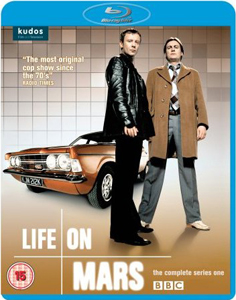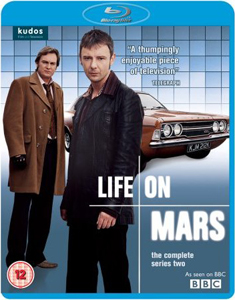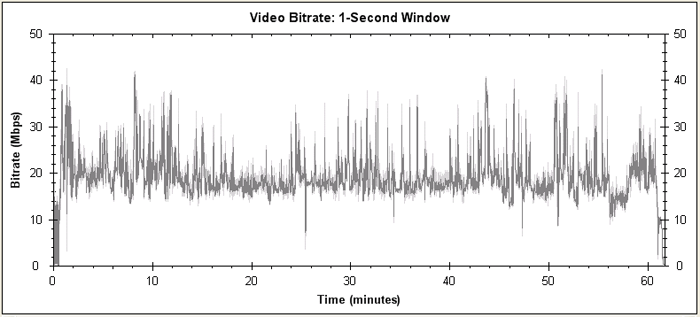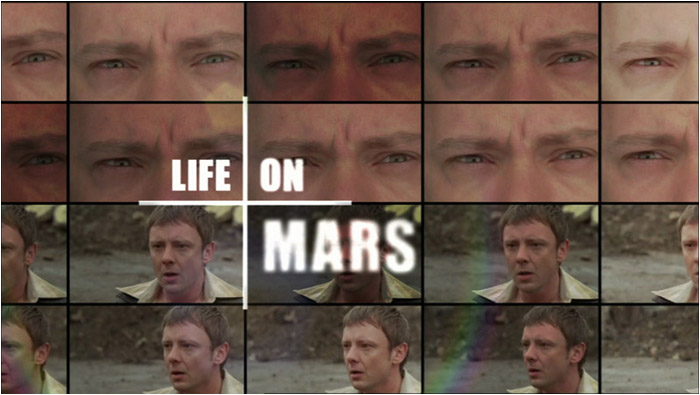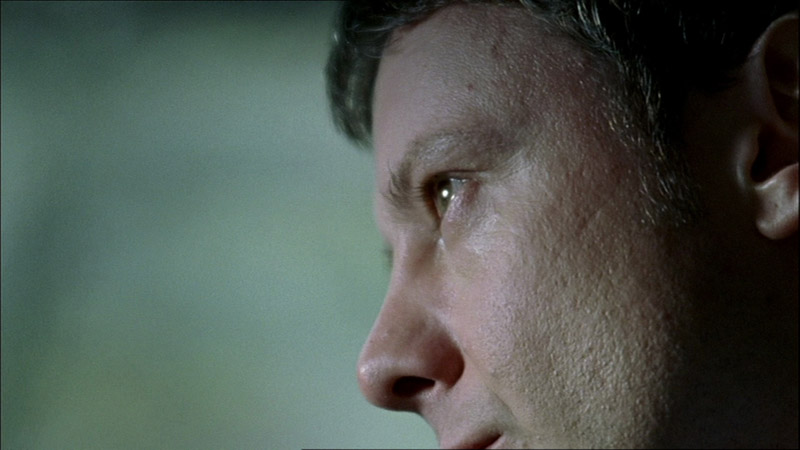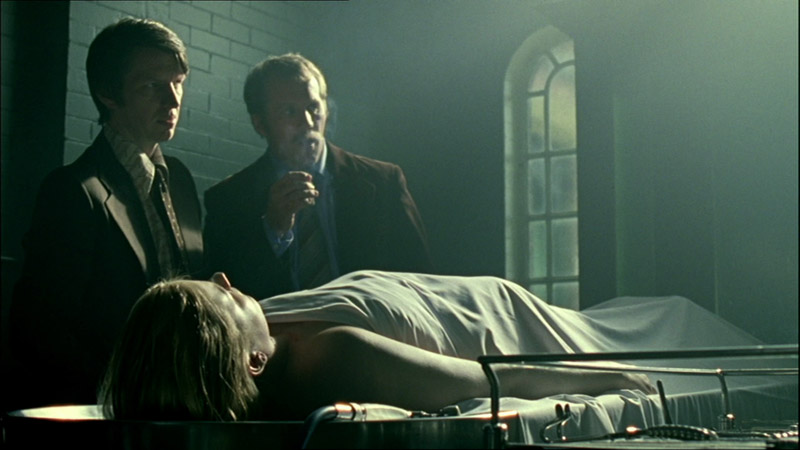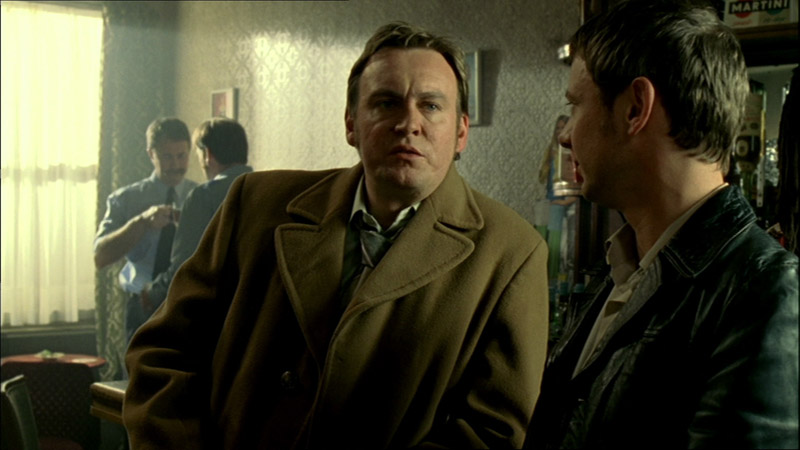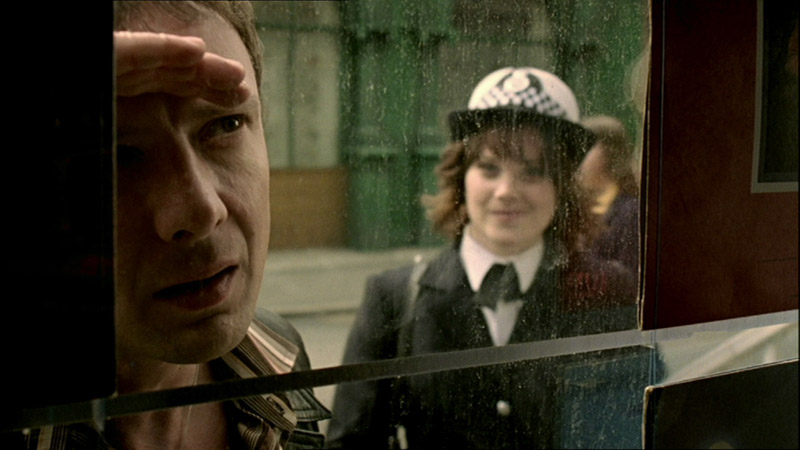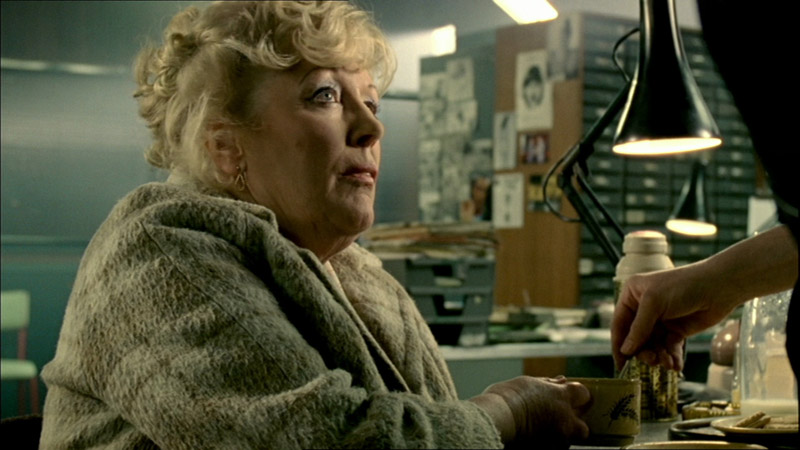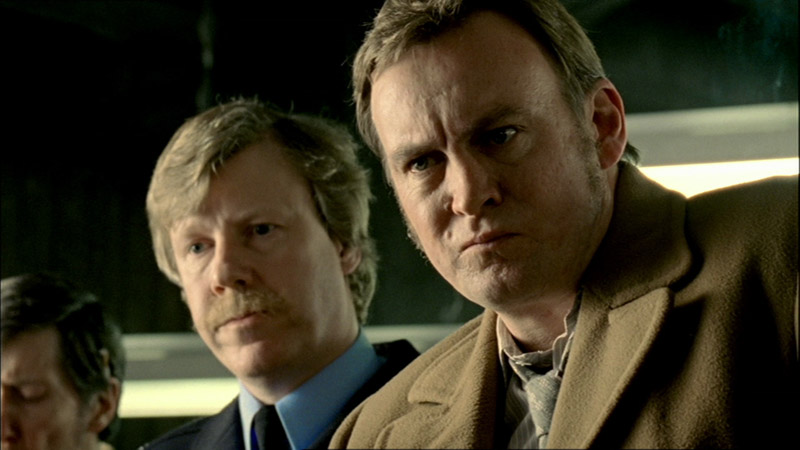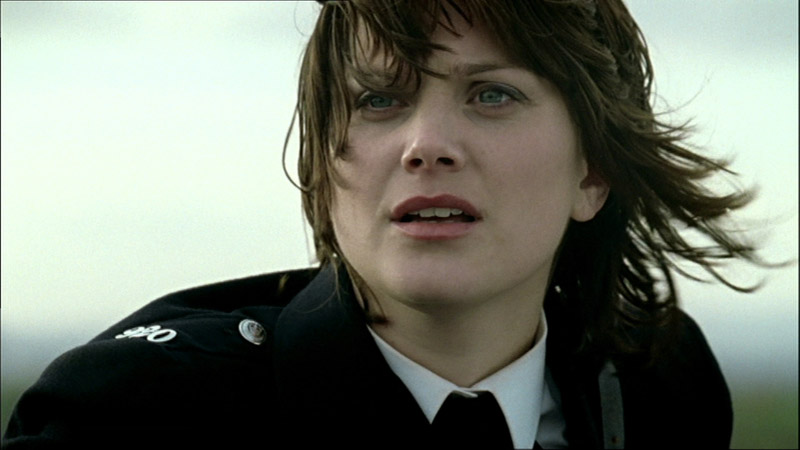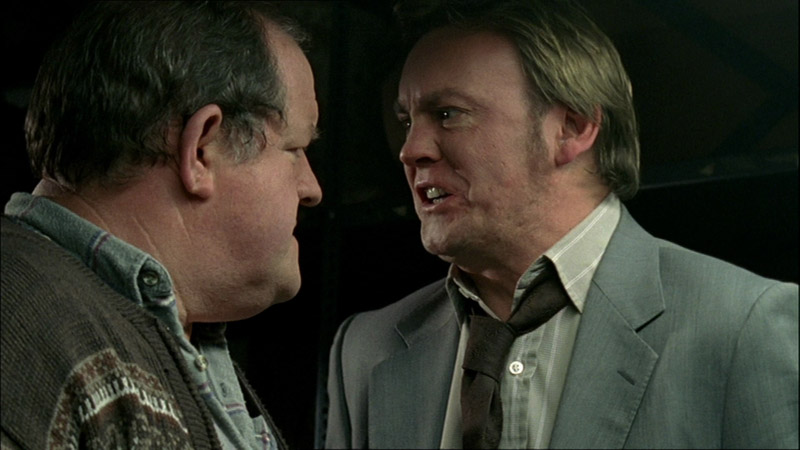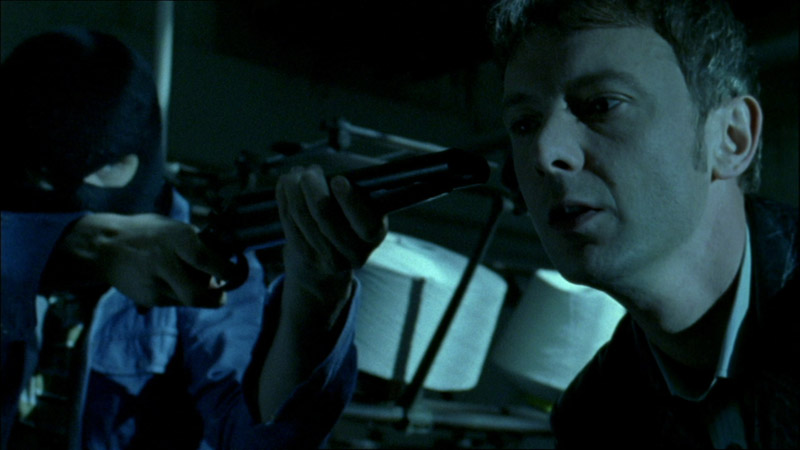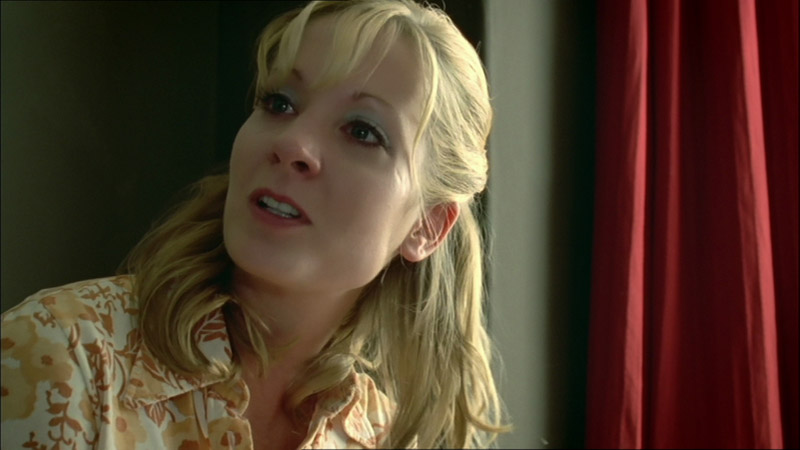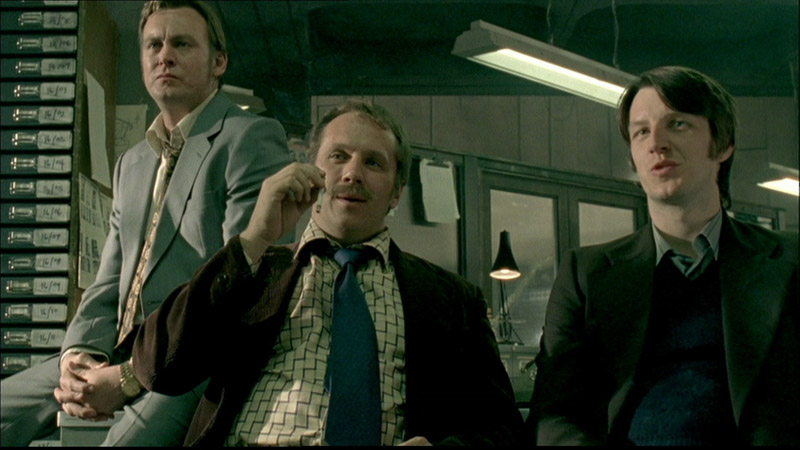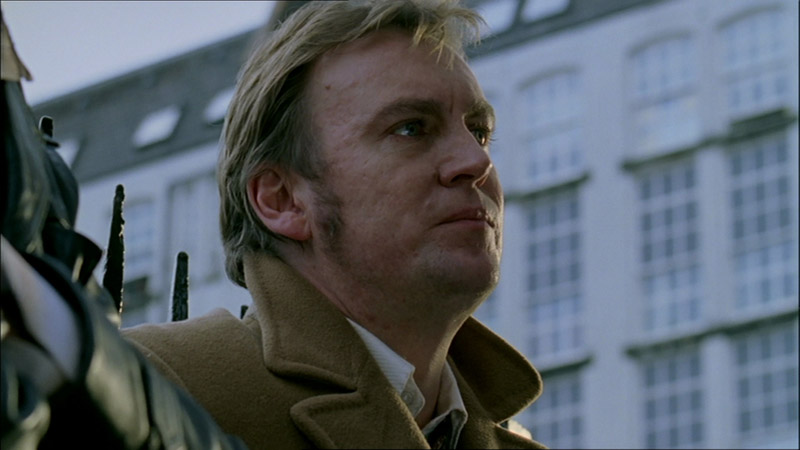Review by Leonard Norwitz
Studio:
Television: Kudos Film & Television
Blu-ray: Contender Home Entertainment
Disc:
Region: FREE!
(as verified by the
Momitsu region FREE Blu-ray player)
Episode Runtime: 1:01:38.736
Disc One Size: 46,748,589,004 bytes
Average Episode Size: 10,962,929,664 bytes
Video Bitrate: 18.97 Mbps
Chapters: 8 per episode
Case:
Two thicker (UK) Blu-ray cases w/ flip-page
Release date:
October 27th, 2008
Video:
Aspect ratio: 1.78:1
Resolution: 1080p / 23.976 fps
Video codec: MPEG-4 AVC Video
Bitrate:
Audio:
Dolby TrueHD Audio English 1345 kbps 5.1 / 48 kHz / 1345
kbps
/ 16-bit (AC3 Core: 5.1 / 48 kHz / 640 kbps)
Dolby Digital Audio English 640 kbps 2.0 / 48 kHz / 640 kbps
Dolby Digital Audio English 192 kbps 2.0 / 48 kHz / 192 kbps
Subtitles:
English, none
Extras:
• Audio Commentaries for All Series One Episodes, with Cast
and Filmmakers
• Take a Look at the Lawman: Documentary with Cast &
Filmmakers (63:30)
• Get Sykes, with Production Designer, Brian Sykes (7:45)
• The Music of Life on Mars, with Composer Edmund Butt
(13:50)
• Outtakes of Series One (5:55)
• Behind the Scenes of 5 Episodes in Series Two (ca. 47:30)
• Series Two: The Return of Life on Mars (45:10)
• Series Two: The End of Life on Mars (27:30)
The Film:
8~9
Tension in the "workplace" has long been used to set a spark
to a drama or comedy. How often have we seen a line level
newspaper investigator or detective butting heads with their
by-the-book bosses. We've seen it in one form or another in
It Happened One Night, The Maltese Falcon, Roman Holiday,
The French Connection, Dirty Harry, Beverly Hills Cop, The
Office, Prime Suspect, Boston Legal - The idea is in danger
of becoming a cliché. I take that back: It is a cliché. But
it's what you do with it that counts.
It would seem that the creators of Life on Mars (the title,
by the way, taken from the David Bowie song) have come up
with a unique and risky solution that combines the notion of
a renegade crusader vs. his hard-as-nails boss on the one
hand with another tried and true device: time travel.
Whether in Star Trek, The Time Machine, or Time After Time
the issue is not only how to get from here to there and back
again, but to offer a look at our own time by contrasting it
with another.
The usual template is for the renegade investigator to be
seen striking out on his or her own, developing promising
leads, returning to their respective bosses and getting
chewed out for stepping over the line. In Life on Mars,
protagonist and antagonist work together as often as not,
thanks to lines of authority that exist in England, but not
in the U.S. In this case, detective and supervisor work so
close together, they are as likely to come to blows as agree
about a suspect's guilt or innocence.
As Series One opens we find DCI (Detective Chief Inspector)
Sam Tyler (John Simm) foiled in his attempts to nail a
killer. Much to his chagrin, evidence comes to light that
places the prime suspect elsewhere at the time of the
murder. (The DCI, by the way is a senior investigative
officer, the one who heads up major investigations.) Tyler's
girlfriend, Maya, is junior to him and her hunches and
feelings are becoming increasingly difficult for him to
accommodate to. In this case, it's not a gender thing, but a
procedural matter, something that has major consequences
presently, so to speak, and for the duration of the series.
Maya goes off to follow one of her hunches only to get
kidnapped by the "real" killer, which drives Tyler more than
a little bonkers. As he stands next to his car feeling torn
this way and that, he is hit by a passing car and lies
unconscious in the road. When he comes to, it's 33 years
earlier, he's still in Manchester, about the same age,
wearing clothes appropriate to the time, still on the force,
but "demoted" to a mere DI (Detective Inspector) and
reassigned to some backwater precinct run by one DCI Gene
Hunt (Philip Glenister). Hunt is like Maya's by-the-gut
feelings writ large, full of testosterone, with all the
authority a DCI can have. His hunches are rarely wrong but
his procedural methods, largely a consequence of the time
and place, are, from Tyler's point of view, prehistoric.
Now, about Tyler's point of view: He is quite certain he is
dreaming all this or, worse, that he is insane. What he is
experiencing is simply not possible. His best guess is that
his mind is creating all these details out of whole cloth
and bits of historical memory. You might think it would be
tempting for him to solve old crimes simply by dint of his
already knowing the solutions – famous cases, and all that –
but the writers don't really have much of a go in that
direction.
Like all time travel dramas, however, there is the question
of how to get back – and in this case, this is Tyler's
overriding concern. At one moment he seriously considers
jumping off a roof in hopes that this, like the proverbial
slap in the face, will wake him from his coma. Coma - well,
that's the magic word, isn't it? And early on, Tyler begins
to hear voices and see persons from those attending his body
in Intensive Care back in 2006, remarking about his
prognosis and the state of his consciousness. It's a one-way
street. He hears them; they don't hear him.
So, we know where Tyler is, if not how he got there. The
dilemma he faces is how to get back while managing his new
day job, a job which is now three times as difficult as the
one he had 30 years later: He is still a stickler for proper
procedure and rules of evidence, but no one else is, to say
nothing of the presumed proper place for ladies in the force
(a WDC – Woman Detective Constable - is good enough to drive
the men about an cleanup the stench of a holding cell.).
Tyler must fit in or he will soon be out of a job with a
one-way ticket to the loony bin. And there are perpetrators
to apprehend: one of them has a strikingly similar M.O. to
the one he was just working on thirty years into the future.
(The writers have a good time with that one.)
None of these shenanigans would amount to much dramatically
if were not for the dynamic chemistry between its stars:
Simm looks the part of an educated man, but still
comfortable on the business end of a bar stool. He's tough
when he needs to be, whether out of desperation or
conviction. Tyler is respectful of others, regardless of the
class or gender, he's no wuss either, but he has no sense of
humor or proportion about his work. Perspective, yes.
Proportion, no.
It is on this front that Philip Glenister shines: Hunt is a
hard, tough man, and he's used to having things his way. But
somewhere in the back of his head he has an innate
understanding and respect for what Tyler is trying to get
across, though he makes certain he is never to be seen as
wrong or giving in, or he would risk losing what grip he has
on his crew – who, no surprise, are 100% behind their boss
when it comes to procedure, evidence, gathering and
treatment of suspects.
The contrast between the two men doesn't stop with their
attitudes about police work and its goal. Hunt sees himself
as the sheriff of a bad town and his job is to put away as
many bad men as possible. While Tyler is, initially at
least, projected as the "good guy" he is also something of a
bore – as righteous people tend to be. Hunt, on the other
hand, has all the good lines – certainly he has all the
funny lines. His humor is rough and tumble, like it just
fell out of a beer mug, but it usually hits its mark with
unerring accuracy.
The supporting characters are gradually drawn out over time.
While Hunt and Tyler butt heads often enough, the more
intense culture clash is between Tyler and Detective Ray
Carling (Dean Andrews). Sam's arrival at the precinct put
the kibosh on Ray's career boost by taking the job that was
lined up for Ray to fill. WDC Annie Cartwright (Liz White)
manages to be Tyler's best friend while doing a pretty good
job of keeping her attraction to him at arm's length.
The writers do not use Tyler's fish out of water as an
opportunity to beat the hell out of a system that has long
been out of favor. Quite the contrary, Tyler is seen to
question his judgment about progress in policing as the
series goes along. The storytellers show what was thirty
years ago very matter of factly (the 70's, by the way, are
tagged subtly rather than liberally) and they pull away from
any sense of outright comedy or, for that matter, horror.
When a vulnerable witness is brought in to I/D a suspect out
of a lineup, Tyler is dismayed that there is no one-way
glass to protect his witness; but he rolls with it, knowing
that the television audience will conclude the obvious.
This level of respect for the viewing audience has been a
hallmark for British television for decades, Life on Mars is
just another example at how that pays off. The middle of the
first season, however, was marred just a bit by a tendency
to preaching (e.g. Football: Good - Holliganism: Bad), but
the tone was dropped shortly thereafter and maintained
creative and exciting theatre right to the end of the second
(and final) season.
Image:
6/7
NOTE:
The below
Blu-ray
captures were taken directly from the
Blu-ray
disc.
The first number indicates a relative level of excellence
compared to other Blu-ray video discs on a ten-point scale.
The second number places this image along the full range of
DVD and Blu-ray discs.
The word is both good and less good here: Put simply, given
the Super16 mm negative, the result, while obviously
upscaled to 1080p, is very agreeable. There is a whiff of
edge enhancement from time to time. Dark edges against a
bright sky can get a mite dodgy. But contrast is well under
control, with strong blacks and plenty of shadow detail.
Color is good, with a tendency to cyan filtration (probably
intended). Noise is kept at a minimum, enough to make out
some grain, though I suspect some selective use of DNR.
Movement is not as smooth as it would be for a larger format
negative or HD video stock. Even though the 16 mm stock
delivers the kind of grit intended, in no way could the
result be mistaken for your average Blu-ray presentation of
a television series. A higher bit rate might have been
helpful, but I shouldn't think it would make a great
difference. One note of carelessness: The credits that
follow each episode have not, apparently, been touched,
refined, or dealt with in any way. On a large screen, they
are almost unreadable, all the more so for their moving so
quickly.
CLICK EACH
BLU-RAY
CAPTURE TO SEE ALL IMAGES IN FULL 1920X1080 RESOLUTION
Audio & Music:7/8
The default audio mix is Dolby TrueHD 5.1, but as for the
surround, it is pretty much non-existent most of the time.
So much so, that I was able to secure a considerably more
dynamic, incisive sound cuing the Dolby Digital Stereo audio
mix (the original, I'd wager) by way of Digital Out from my
OPPO into a separate Digital-to-Analog converter before
passing the signal on to my preamp, 2-channel amplifier and
front stereo speakers. There is smart use of 70's music,
which the commentators usually identify, even if the credits
don't.
Operations:
6
Even though Contender isn't a big player in the home
entertainment business (I had never seen a video from them
previously), there are no adverts or promos for other
releases by these guys (perhaps there aren't any), so we get
to the main menu as soon as the Contender logo has had its
way. The Audio Commentaries are located under Set-Up, not
Extras, and they do not indicate who's on which. While not
as thick as some Manchester brogues I have encountered, I
was grateful for subtitles from time to time. Ditto that for
police slang and codes. And before I forget, I should remind
you that Contender's Life on Mars on Blu-ray is coded All
Region (or, more responsibly at least, Region A & B for
sure). Same for the Extra Features. All with no PAL
speed-up. Points off for the unnecessary use of the flip
page – twice.
Extras:
8
The Series One set of Life on Mars has extra features that
cover aspects of production, casting and development, but if
you are hoping for a feature or commentator to explicate
British police protocols and hierarchies, you will be
disappointed. These guys know their audience – and it isn't
me, sadly. I sampled several commentaries by the creators,
writers, producers and directors and found them to be sober
analyses of production and storyline issues, with occasional
comments about direction and performance of character.
Almost all of the featurettes are presented in clean
anamorphic standard definition (better still on the series
two set); the outtakes reel (pointless, no less here than
usual) is in 4;3, but looking pretty good considering. All
told, there are some three and a half hours of extra
features, all but the outtakes will be rewarding to anyone
who enjoys the series.
|
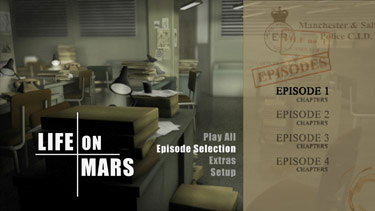 |
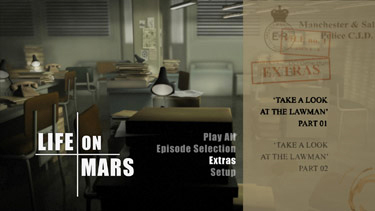 |
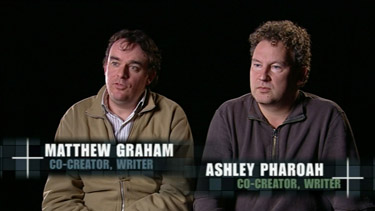 |
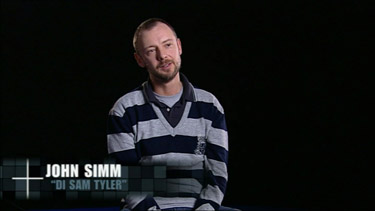 |
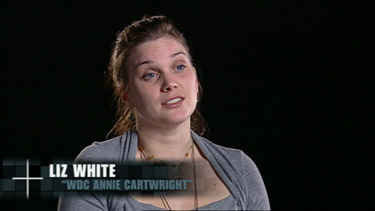 |
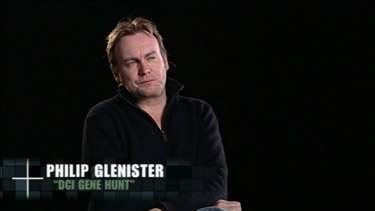 |
Bottom line:
9
A cleverly conceived, brilliantly acted series, with a
beginning, middle and end, complete in sixteen hours over as
many episodes on two seasons. The only downside is its
having been shot on 16 mm. But don't let that dissuade you.
Even projected on a 100 inch screen, there is plenty enough
resolution to keep your eye and brain from wandering. The
many extra features, especially for Series One, are a plus.
At this writing, Amazon/UK is practically giving the two
series away for just a little over £20 plus shipping –
that's for both series together, which comes to maybe
U.S.$2.20 an hour. Compare that to just about anything half
as entertaining sitting on your shelf today.
Leonard Norwitz
March 10th, 2010
![]()
![]()

![]()
![]()
![]()
![]()

![]()
![]()

